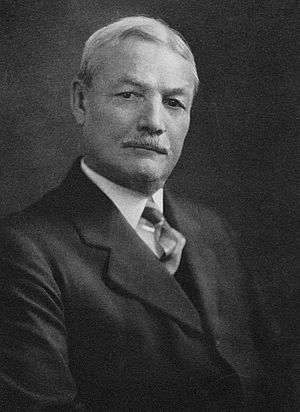Charles McLean Andrews facts for kids
Quick facts for kids
Charles McLean Andrews
|
|
|---|---|
 |
|
| Born | February 22, 1863 Wethersfield, Connecticut, USA |
| Died | September 9, 1943 (aged 80) New Haven, Connecticut, USA |
| Occupation | Historian |
| Nationality | American |
| Period | 1888–1937 |
| Subject | American History, Colonial History |
Charles McLean Andrews (born February 22, 1863 – died September 9, 1943) was an American historian. He was a top expert on the history of the American colonies. He wrote many important books and articles.
Andrews is famous for leading the "Imperial school" of historians. This group studied the British Empire in the 1700s. They often admired how well the empire worked. One historian, Kross, said Andrews left two main ideas. First, he believed all history must be based on facts. You had to find, organize, and check all the evidence. Second, he taught that you can't understand early America without also studying England.
Life and Achievements
Charles McLean Andrews was born in Wethersfield, Connecticut. His father was a minister. Andrews went to Trinity College and graduated in 1884. After teaching high school for two years, he went to Johns Hopkins University. There, he earned his Ph.D. in 1889.
He became a professor at Bryn Mawr College and then at Johns Hopkins University. In 1910, he moved to Yale University. He taught American History at Yale until he retired in 1931.
Andrews was very respected by other historians. He became the president of the American Historical Association in 1925. He was also a member of many important groups. These included the American Philosophical Society and the Royal Historical Society.
In 1935, Andrews won the famous Pulitzer Prize for history. He won it for the first part of his big four-book series, The Colonial Period of American History. He also received a special gold medal for his work in history. Many top universities, like Harvard and Yale, gave him honorary degrees.
Andrews married Evangeline Holcombe Walker. Their daughter, Ethel, married John Marshall Harlan II. He later became a judge on the highest court in the United States. Charles McLean Andrews passed away in New Haven, Connecticut.
How He Studied History
Andrews' family had lived in Connecticut for many generations. So, it's not surprising he was interested in early American history. His first book was about the founding of towns like Wethersfield and Hartford.
Andrews, along with Herbert L. Osgood, started a new way of looking at colonial American history. They called it the "imperial" approach. Andrews and Osgood focused on how the American colonies were connected to Great Britain. They wrote important articles about this idea in 1898.
Instead of saying the British were simply mean leading up to the American Revolution, Andrews saw it differently. In his book The Colonial Period, he suggested that the conflict was unavoidable. He believed British leaders just couldn't understand the changes happening in America.
Andrews was known for his very detailed research. He looked deeply into old records and documents. His many books and articles set a high standard for other historians. His colleagues called him the "dean" of colonial historians. Some of his students at Yale also became important "imperial" historians. These included Leonard Woods Labaree and Lawrence Henry Gipson.
A Famous Quote
In 1924, Charles McLean Andrews wrote something important about history:
How a country looks at its own history is like a window into its soul. People in that country cannot meet today's challenges if they are not honest, kind, open-minded, and smart about the past that made them who they are.
 | John T. Biggers |
 | Thomas Blackshear |
 | Mark Bradford |
 | Beverly Buchanan |

